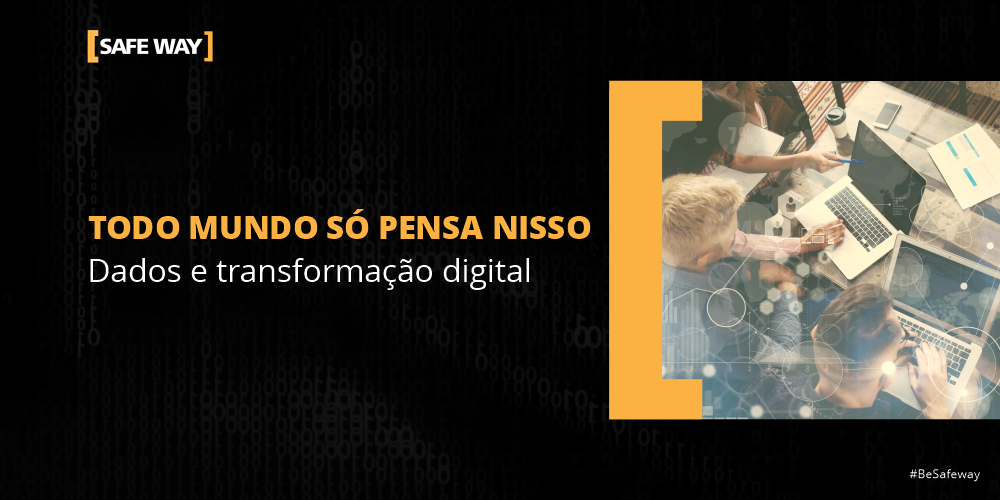*By Fábio Moraes
Surely you've seen that stat that says 90% (sometimes more) of all human-created data was generated in the last two years. This number may be true, it may not. But in a digital economy scenario like the one we live in today, the relentless repetition of this number only demonstrates that data is, in fact, the fuel of the future.
In other words: If you want a successful business, you need to handle data well..
In this article, I want to show you exactly what you need to do to make your data work — especially in the data model. big data — be successful. It may sound strange, but in fact, data management and analytics leaders say that most companies they do not know what to do with your data, whether in terms of profit and especially security (of the company and the customer). In light of good IT governance and management practices, this is very complicated. Not to mention the economic losses that bad management causes.
the die and the leader
Why does everyone just talk about data? Well, imagine the following: imagine that you are a merchant who is in doubt about your customers' consumption habits and desires. Also, you want to make a card for your store, but you don't know exactly what kind of credit offer to provide to your customers.
But then you discover that there is a way to know all the answers you are looking for: with data. Find out what they are looking for, what type of transactions they carry out, and which transactions best match their profiles. Who unlocks this secret for you is the given away.
And to find out which offer can be generalized to the widest range of customers possible, you can put all of this information into one machine and generate two valuable solutions for your organization: not only do you have this offer that you can look for, but, with additional data, it can, through another disruptive element, know whether or not a potential customer is a name to have credit offered.
The gains that the data offer to leaders are extraordinary, seen from this point of view. And check this out: great leaders have always known this. In eleventh-century England, King William the Conqueror ordered the court treasurers to roam the country to discover how many possessions, how many head of cattle, and how much other wealth each of the kingdom's citizens possessed. The result was known as the Accounting Book — in English, Domesday Book. As people believed that at the Last Judgment, everyone would have to be accountable to God as they had to be accountable to the king, so the name Domesday Book became doomDay Book: The Book of Doomsday.
King William needed a year to do all the accounting of the data of his citizens. Other leaders did the same thing. So, if since the Middle Ages the data has been present in the life of the leadership, why does everyone talk so much about it today?
The data and the digital
The big question is the digital transformation. In the hypothetical example I gave above, I said that data can generate new information and new solutions: collecting it and putting it to be interpreted by a technology that allows you to know the reliability of a customer.
The difference is in the digital transformation. Processing and interpreting data with automation and machine learning technologies is something that has never been possible before. And this is one of the big changes in Industry 4.0. This allows for a streamlined process (improving both Customer and Employee Experience), as well as cost savings and an improved focus on the organization's safety and security.
By the way, if I could tell you what the three elements that define big data are in light of the digital transformation, the elements are exactly these:
- Streamlining;
- Cost reduction;
- Security and strategic thinking.
Digital data is on the pillar of the paradigm shift we are seeing in the market today. It is important to bring it into current models of governance and digital security. As I said at the beginning of the text, they are responsible for a large profit margin — and safety too. And the time to adapt them to current requirements is now.
That's why everyone only thinks about him.
— Fábio Moraes is a Digital Transformation Lead Partner at SAFEWAY
About [SAFEWAY]
THE SAFEWAY is an Information Security company, recognized by its customers for offering high added value solutions, through Information Security projects that fully meet business needs. In these years of experience, we have accumulated, with great pride, several successful projects that have earned us credibility and prominence in our clients, which constitute in large part, the 100 largest companies in Brazil.
Today through over 22 strategic partnerships with global manufacturers and our SOC, SAFEWAY is considered a one stop shopping with the best technology solutions, processes and people.
Safeway can help customers better understand their Information Security needs, as well as the tools needed to detect, respond and mitigate their risks involving threats and regulatory issues. In this way, our professionals and expert consultants can help eliminate small problems before they become big ones. Security, Vulnerabilities and Fraud Management actively analyzes your company's security through monitoring activities, mitigating risks and attacks in the IT environment.




